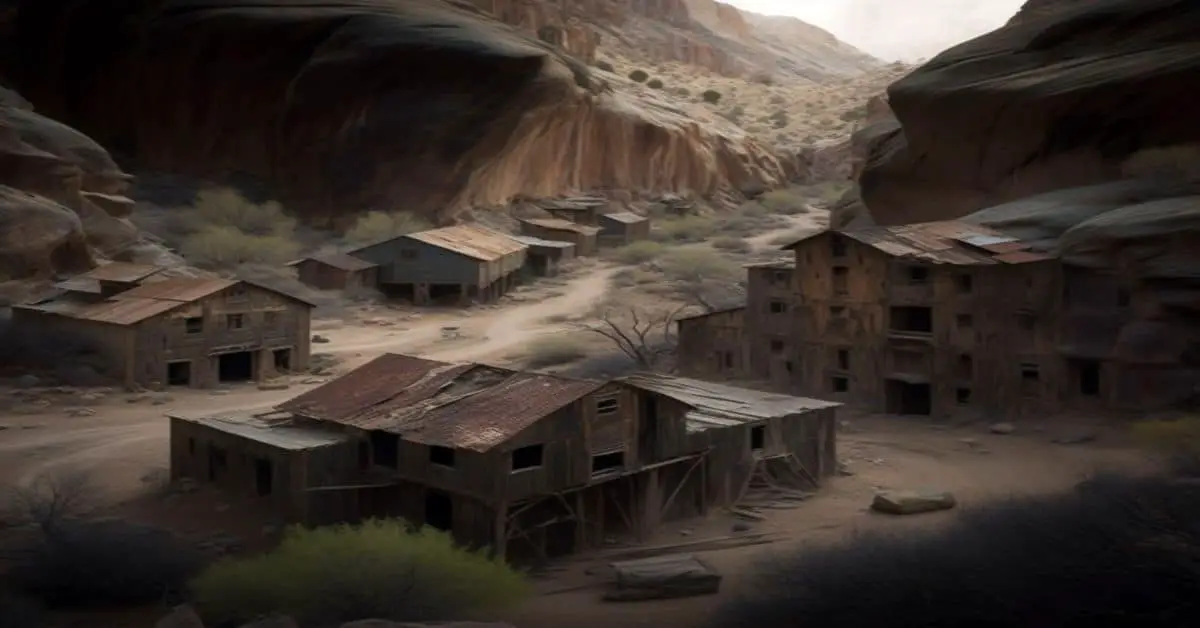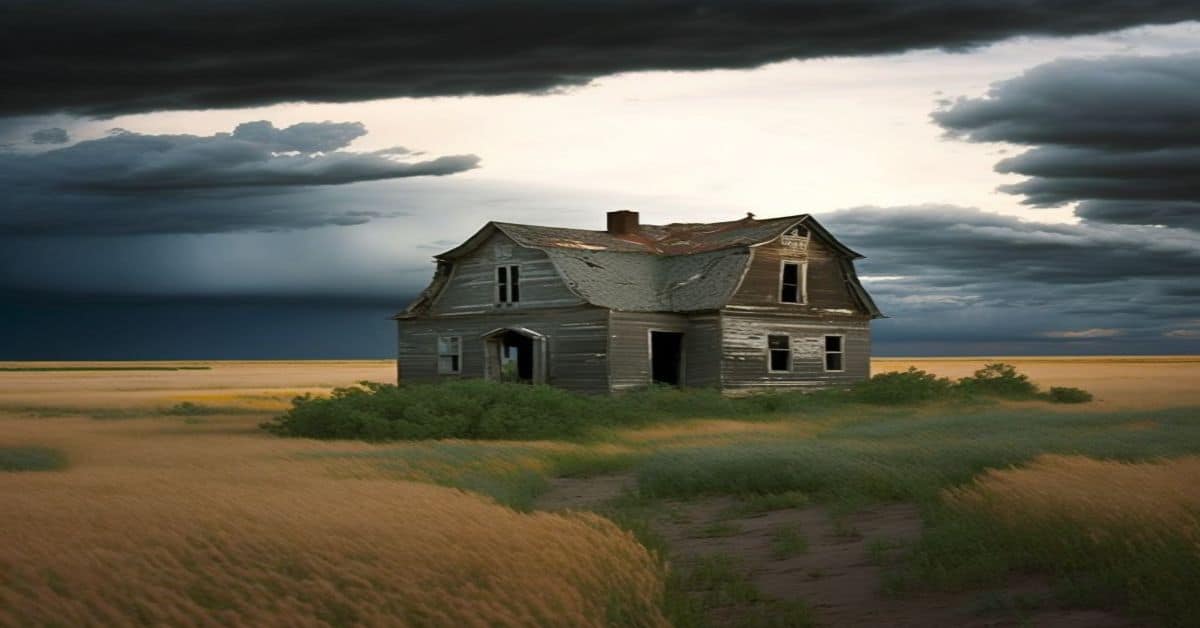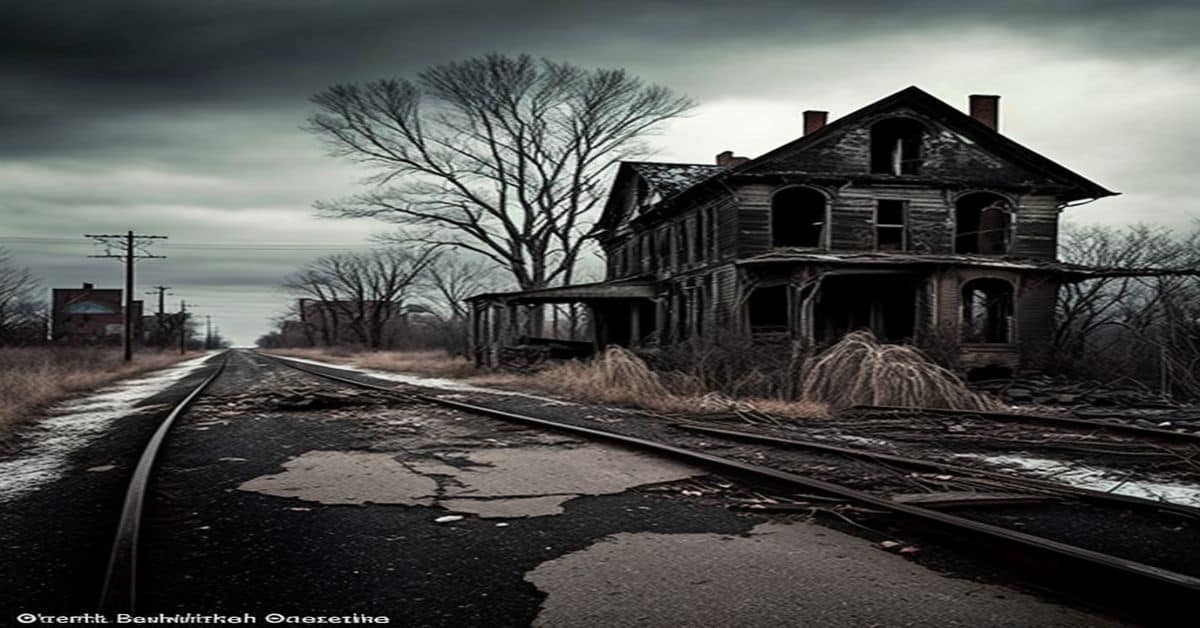Rochelle, a once-thriving small town in Texas, now stands abandoned, haunted by the memories of its prosperous past.
Located in central Texas, the town was originally called Crewville or Crothers, but was renamed by a settler from La Rochelle, France.
The arrival of railroads in the early 20th century caused Rochelle to flourish, with a population of around 700 by 1914.
However, the town’s fate turned for the worse when the Gulf, Colorado and Santa Fe Railway abandoned its track through the community in 1959, leading to a steady decline in population and ultimately resulting in the town’s abandonment.
Despite its deserted state, Rochelle continues to captivate visitors with its eerie ambiance and haunting legends.
Many have reported hearing the sound and sight of a train crossing the bridge at night, even though the tracks have long been removed.
In this article, we will delve into Rochelle’s history, transportation and infrastructure, population boom and bust, and current status as an abandoned town.
We will also explore the ghostly tales surrounding Rochelle, making this town a fascinating destination for those seeking the thrill of the unknown.
Key Takeaways
- Rochelle was once a bustling town in central Texas that flourished due to the arrival of railroads in the early 20th century.
- The Gulf, Colorado and Santa Fe Railway abandoned its track through the community in 1959, leading to a decline in economic activity and population, and the town is now abandoned.
- Despite being in a state of disrepair, Rochelle has potential for revitalization and could be marketed as a historic destination.
- The town’s haunting ambiance and unique location could make it an attractive destination for those seeking a quieter, more rural lifestyle or the thrill of the unknown.
Name and History
Originally known as Crewville or Crothers, the Texas ghost town of Rochelle was renamed after a local settler from La Rochelle, France. The renaming of the town reflected the French settler’s appreciation of the area’s natural beauty, which reminded him of his hometown in France.
The town grew substantially with the arrival of the Fort Worth and Rio Grande Railway in 1903 and the completion of the Gulf, Colorado and Santa Fe Railroad in 1912. However, the Gulf, Colorado and Santa Fe Railway abandoned its track through the community in 1959, leading to the town’s population decline.
The history of Rochelle is a testament to the importance of local settlers in shaping the development of a town. It was the vision of the French settler that led to the town’s renaming, and the arrival of the railroads brought new economic opportunities that helped the town prosper. However, the departure of the railroads in the mid-20th century resulted in the decline of Rochelle’s population.
Despite this, the town’s history remains preserved in its abandoned buildings and infrastructure, providing a haunting glimpse into its past.
Transportation and Infrastructure
The arrival of railroads in the early 1900s caused substantial growth in the community of Rochelle, with the Fort Worth and Rio Grande Railway and Gulf, Colorado and Santa Fe Railroad laying tracks through the area. The presence of these railroads led to a rise in population and economic activity, as they provided a means for transportation of goods and people.
However, the Gulf, Colorado and Santa Fe Railway abandoned its track through the community in 1959, leading to a decline in economic activity and population.
Despite the abandonment of the railroads, remnants of the transportation infrastructure can still be seen in Rochelle. U.S. 190 highway bends and dips as if the railroad never left, and sections of bridge support can be seen at the bottom of the highway. The R.O.W. is now a county or city road, and at night, sounds of a train can be heard or seen crossing the bridge.
These abandoned bridges and railway ghosts serve as a haunting reminder of the community’s past and transportation’s impact on its growth and decline.
Population and Current Status
Currently, the population of this former community is sparse, with only a handful of residents remaining. Most of the buildings and infrastructure are in disrepair, leaving a sense of nostalgia and a longing for what once was. The once-bustling town that was home to over 700 people in the early 1900s now feels like a ghost town, with many of its buildings abandoned and up for sale.
Despite its current state, there is potential for revitalization in Rochelle. The town’s rich history and unique location could make it an attractive destination for those seeking a quieter, more rural lifestyle. The remaining buildings and infrastructure could be restored and repurposed, and the town could be marketed as a historic destination.
However, it would take significant effort and investment to bring the town back to life, and it remains to be seen if anyone will take on the challenge.
Frequently Asked Questions
Are there any reported paranormal activities or ghost sightings in Rochelle?
Paranormal investigations and local legends suggest that Rochelle may be haunted. Some have reported seeing apparitions and hearing unexplained noises, including the sounds of a train crossing the abandoned tracks.
What was the main industry or economic activity in Rochelle during its peak population?
With agriculture as the main industry, Rochelle’s peak population of 700 relied on cotton, peanuts, and livestock. Economic changes, including the abandonment of the railway, caused a decline in population to just 100 by the 1960s.
Are there any notable events or famous individuals associated with Rochelle’s history?
Notable events or famous individuals associated with Rochelle’s history are not mentioned in the background information. However, historical landmarks in Rochelle include the Depot, which is now a community center, and a one-room schoolhouse built in 1886.
What is the landscape or natural environment like in Rochelle and its surrounding areas?
The natural environment surrounding Rochelle boasts scenic beauty and wildlife diversity. Hiking trails and fishing spots are popular attractions. The area’s landscape includes rolling hills, wooded areas, and streams, adding to its tranquil charm.
Are there any plans or efforts to revive or develop Rochelle in the future?
Future plans for Rochelle remain unclear, but community involvement may lead to potential development or preservation efforts. As an unincorporated area, the fate of the town is largely dependent on local efforts and interest.


